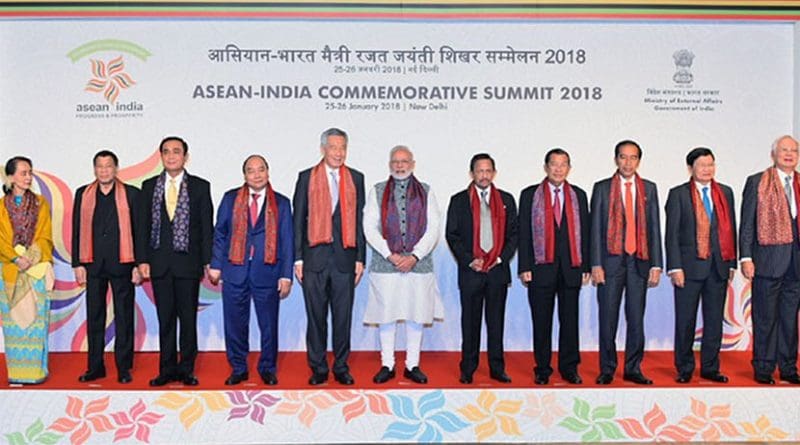Maritime Security Dominates India-ASEAN Summit
By BenarNews
By Akash Vashishtha and Rohit Wadhwaney
Indian Prime Minister Narendra Modi urged ASEAN leaders to strengthen maritime collaboration with his country during a speech here on Thursday that was widely believed to be aimed at countering China’s growing influence in South and Southeast Asia.
Modi was hosting the leaders of all 10 members of the Association of Southeast Asian Nations at a two-day a summit in New Delhi to commemorate the 25th anniversary of Indo-ASEAN relations.
“India shares the ASEAN vision for rule-based societies and values of peace. We are committed to work[ing] with ASEAN nations to enhance collaboration in the maritime domain,” Modi told the visiting leaders from the Southeast Asian bloc.
They included Philippine President Rodrigo Duterte, Indonesian President Joko “Jokowi” Widodo, Malaysian Prime Minister Najib Razak, and Thai Prime Minister Prayuth Chan-o-cha.
“Our shared voyage goes back thousands of years. Your collective presence in India has touched every Indian,” Modi said.
As the summit ended on Thursday, India and the ASEAN bloc issued a joint statement, the Delhi Declaration, in which they agreed to “further strengthen and deepen the ASEAN-India Strategic Partnership for mutual benefit” across a wide spectrum of issues.
Among these, India and ASEAN reaffirmed their bilateral commitment “to work closely together on common regional and international security issues of mutual concern.”
The declaration stressed the importance of maintaining and promoting peace, stability, maritime safety and security, as well as “freedom of navigation and overflight in the region” and “unimpeded lawful maritime commerce” – an apparent reference to China’s territorial claims to the South China Sea.
In addition, the declaration resolved to “deepen cooperation in combating terrorism in all its forms and manifestations, violent extremism and radicalization through information sharing, law enforcement and capacity building.”
‘Trying to gain an edge’
According to Indian security experts, Prime Minister Modi used the occasion to articulate India’s so-called “Look East” doctrine. This aims to expand ties with countries in East Asia to contain China’s growing influence in the region.
In South Asia, Beijing is building and financing mega-infrastructure projects in neighboring countries, such as a major port and highways in Sri Lanka, that are seen as a direct challenge to India’s influence in its own back yard.
“The Indian government is now building a momentum with strategic initiatives. These [ASEAN] nations also view China as a challenge and are hoping to find a trustworthy, reliable partner to counter China’s bullying tactics,” Vinay Kaura, coordinator at the Centre for Peace and Conflict Studies in Rajasthan, told BenarNews, referring to tensions over the South China Sea.
Of the 10 ASEAN nations, the Philippines, Thailand, Malaysia, Vietnam and Brunei have territorial claims over the sea, which China claims in its entirety. The other five countries that form the ASEAN bloc are Indonesia, Singapore, Myanmar, Cambodia and Laos.
In 1962, neighboring Asian giants India and China fought a full-blown war that killed over 2,000 people during the course of a month, according to official figures. Decades later, the two countries continue to have skirmishes over territorial disputes along India’s northeast border.
“India is trying to gain an edge at this time by trying to exert more pressure on China. India is left with no option but to send this message that it will not be a silent spectator to China’s bullying,” Kaura said.
“But at the same time, India needs to garner enough economic resources and modernization to help these countries in order to ensure that the South China Sea remains free for navigation,” he added.
A senior official of India’s Ministry of External Affairs confirmed on condition of anonymity that discussions at the summit were oriented toward issues of maritime security between India and ASEAN in view of China’s military assertiveness in the 3.5 million sq-km (1.4 million sq-mile) resource-rich sea.
“Humanitarian and disaster relief efforts, security cooperation and freedom of navigation will be the key focus for our maritime cooperation,” Modi said at the summit, as he unveiled postage stamps marking the silver jubilee of India-ASEAN friendship.
Modi’s statement came a day before India celebrates its 69th Republic Day. It will honor the leaders of the 10 ASEAN nations as chief guests during a parade in New Delhi that showcases the country’s military and cultural prowess.
The unusual move to have 10 foreign dignitaries as chief guests, instead of one, is a strategic decision by the Modi government to enhance India’s foothold in the Asia-Pacific region, which is largely influenced by China, Kaura said.
Indian honors for Southeast Asians
During the summit, Modi held separate bilateral meetings with President Duterte, Prime Minister Najib, Myanmar State Counsellor Aung San Suu Kyi, and Vietnamese Prime Minister Nguyen Xuan Phuc.
He also announced the Padma Shri Award – India’s fourth highest civilian honor – for one person from each ASEAN country, in what was described as an “unprecedented and symbolic gesture of India-ASEAN bonding” by the government.
The awardees include Nyoman Nuarta, an Indonesian sculptor; Ramli-bin Ibrahim, an Indonesian dancer; Jose Concepcion, a businessman from the Philippines; and Somdet Khottayan, the supreme patriarch of Thailand’s Buddhist clergy.
“The government is only underlining a process and a policy initiative. There is hardly any change,” Praveen Jha, a professor at the Center for Economic Studies and Planning at New Delhi’s Jawaharlal Nehru University, told BenarNews, referring to India’s relationship with ASEAN. “It seems India is just trying to play a discourse on China.”

